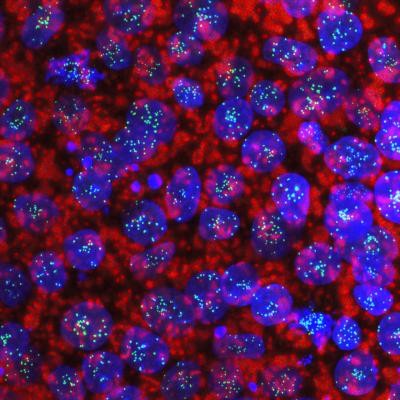Human 'gene atlas' created using stem cells

Scientists from the Hebrew University of Jerusalem have generated an atlas of the human genome using gene-editing technology and human embryonic stem cells — a breakthrough that is helping to illuminate the roles that our genes play in health and disease.
Embryonic stem cells can turn into any adult cell in our bodies, putting them at the centre of attention in the fields of regenerative medicine, disease modelling and drug discovery. In parallel to the discovery of human embryonic stem cells, another milestone in biology was completed with the sequencing of the human genome, and the identification of the entire set of genes responsible for our genetic identity. This finding has led to a new challenge of understanding the function of the genes in the human genome — one that the Hebrew University scientists set out to overcome.
The researchers analysed virtually all human genes in the human genome by generating more than 180,000 distinct mutations. To produce such a vast array of mutations, they combined a sophisticated gene-editing technology (CRISPR-Cas9 screening) with a new type of embryonic stem cell that was recently isolated by the same research group. This new type of stem cell harbours only a single copy of the human genome, instead of two copies from the mother and father, making gene editing easier thanks to the need of mutating only one copy for each gene.
Writing in the journal Nature Cell Biology, the researchers revealed that a mere 9% of all the genes in the human genome are essential for the growth and survival of human embryonic stem cells, whereas 5% of them actually limit the growth of these cells. They could also analyse the role of genes responsible for all hereditary disorders in early human development and growth. Furthermore, they showed how cancer-causing genes could affect the growth of the human embryo.
“This gene atlas enables a new functional view on how we study the human genome and provides a tool that will change the fashion by which we analyse and treat cancer and genetic disorders,” said Professor Nissim Benvenisty, senior author of the study.
Another key finding was the identification of a small group of genes that are uniquely essential for the survival of human embryonic stem cells but not to other cell types. These genes are thought to maintain the identity of embryonic stem cells and prevent them from becoming cancerous or turning into adult cell types.
“This study creates a new framework for the understanding of what it means to be an embryonic stem cell at the genetic level,” said Dr Atilgan Yilmaz, a lead author on the paper. “The more complete a picture we have of the nature of these cells, the better chances we have for successful therapies in the clinic.”
ADHD may be linked with an increased risk of dementia
An adult brain affected by attention deficit hyperactivity disorder (ADHD) presents modifications...
Placebos appear to reduce PMS symptoms
Women affected by premenstrual syndrome (PMS) appear to experience less intense and debilitating...
Medicinal cannabis linked to long-term health benefits
As scientists find a way to improve the effectiveness of CBD, a separate study shows that...




